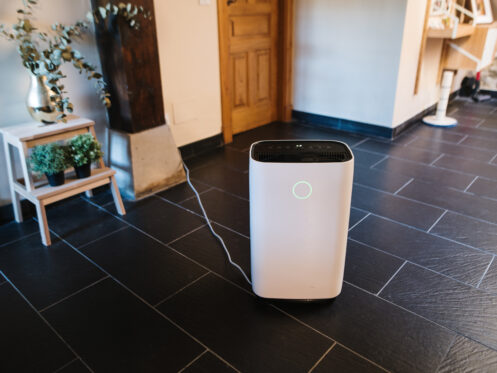Moisture is integral to mold growth as without it mold simply cannot grow. A dehumidifier is an appliance that extracts moisture from the ambient air. Therefore, it stands to reason that if a dehumidifier can control humidity, it can play some role in controlling mold. But the answer is multifaceted and depends on the source of the moisture and extent of the mold.
Does High Humidity Cause Mold?
Yes. It is one of the reasons experts recommend maintaining your home at a relative humidity below 60% at least. At this RH, there is simply not enough moisture for mold to flourish. Note that this pertains specifically to airborne water vapor. Moisture in other mediums is another matter entirely that we’ll get to shortly. If your home is routinely at a 60% RH (relative humidity) or higher in summer, it is highly likely that you have a high presence of mold spores in the air. It also makes it much easier to cause mold spores by overwatering plants. Mold spores are where mold problems begin. A dehumidifier is very helpful in that regard. If a colony becomes established, however, a dehumidifier won’t do very much at all.
Which Mold Problems Does a Dehumidifier Help Avoid?
Mold does not need a lot of water to grow, but it does need a lot to become what is labeled an infestation. Basements, crawl spaces and bathrooms are three key areas in homes where a dehumidifier really makes a difference. A dehumidifier helps to avoid the mold that can build up on basement walls or on encapsulation and insulation materials in crawl spaces. In bathrooms, it helps with the mold commonly found on and in showers, baths, tile and grout. It can help with mold around sinks in bathrooms but really all rooms. Dehumidifiers also help to prevent mold on windows, including that caused by excess condensation.
Moisture Isn’t the Only Issue to Consider
Moisture is not the only problem when it comes to mold. Mold needs a food source. An ample food source can turn a small mold problem into a big one quickly. This is why the Environmental Protection Agency (EPA) warns that houseplants and potting soil can often be problematic. Old newspapers are as well. Temperature, however, is not a factor. This is a common misconception because it is more humid in summer. Nevertheless, if you have enough moisture and a food source in a localized area, mold can flourish in very cold temperatures. Even extreme cold won’t kill mold but rather just deactivate it.
Do Dehumidifiers Help With Mold Infestations?
Dehumidifiers can help a little but not to the extent you’ll need. A dehumidifier can certainly help you avoid some mold buildup in your shower, for instance. But if you have an actual mold colony growing on a wall or window, that likely indicates a much more substantial source of water. Unless you’ve been keeping your home at an 80% RH or higher for an extended period, you probably have a leak. Leaks in roofs and windows and leaking pipes can all lead to mold even if you have a dehumidifier set to an optimal RH.
Do Dehumidifiers Help With Mold Remediation?
Yes, absolutely. In fact, professional remediation typically involves bringing fans, air filters and dehumidifiers into the home right away. Once the waterlogged materials have been removed, the goal is to filter out mold spores, achieve ample circulation and remove excess moisture from the air. This helps to ensure that the mold doesn’t simply return after being removed. It also helps eliminate any odors created by the mold. Once the mold colony is gone, the air is dry and most mold spores have been removed, a dehumidifier is invaluable in maintaining that.
What Is the Ideal RH for Your Home?
Experts recommend keeping your RH below 60% and below 70% at the very least for the purposes of avoiding mold. That said, the ideal RH for your home according to the EPA is between 30% and 50%. The guidance from the EPA is to find the lowest RH in that range at which you and your family are comfortable. Doing so will improve energy efficiency and help you avoid other issues, such as dust mites.
Will Running a Humidifier Cause Mold Problems?
Running a humidifier is not inherently problematic. Most homeowners run theirs in winter to counteract the drier air. If a humidifier is causing an RH of 60% or up, then yes, that certainly can lead to mold. Other potential problems with humidifiers when it comes to mold are leaks and excess condensation. But it’s worth noting that these issues can be present with dehumidifiers as well.
Portable vs. Whole-Home Dehumidifiers
Portable dehumidifiers are less expensive than home-wide solutions. They’re also convenient in that you can move them from room to room as needed. The downside is that they do little to deal with a systemic problem. If your home is at or above 60% RH, your portable unit may make you feel better, but it won’t help to stop the mold growing in your bathroom. If you have a central HVAC system, a whole-house dehumidifier can be integrated into it. This will be the more expensive option up front but will provide you superior mold prevention in the years ahead.
How to Maintain a Dehumidifier for Mold Prevention
Every dehumidifier has a filter that needs to be checked regularly and replaced or cleaned as needed. Whether you need to clean or replace it depends on the type of filter. Failure to do so will result in decreased performance. That means reduced energy efficiency and eventually the inability to reach the desired RH. In the case of a portable unit, the reservoir that collects extracted moisture needs to be emptied. Whole-house systems don’t need to be emptied. They have a drain line much like an air conditioner or heat pump does. They do require professional service. We recommend having them maintained once a year. A good time to have this done is the same time you have your air conditioner or heat pump serviced in spring prior to the cooling season.
What About an Air Purifier?
If you are researching a dehumidifier for mold control purposes, an air purification system is worthwhile consideration as well. A dehumidifier can’t remove mold spores, but an air cleaner can. Basic systems with a HEPA filter can trap more than 99% of the spores that pass through. You may want to consider UV filtration as well. The ultraviolet light actually renders the spores inert and therefore unable to start colonies.
HVAC Industry Leaders Serving Rockport and the Surrounding Areas
If you have a humidity problem in your home, Sigwald Service Co. is here to help. We are home comfort specialists with more than 40 years of experience serving Rockport and the neighboring communities. Our company also provides installation, maintenance and repair services for all heating and cooling technologies, including furnaces and air conditioners. You can also take advantage of our memberships to save money while ensuring that your HVAC equipment is serviced on schedule. Call us today or contact us online to schedule an appointment or with any questions about our services.






